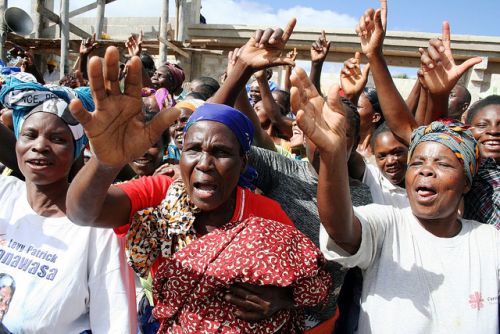- Ellen Johnson Sirleaf – President of the Republic of Liberia
- Joyce Banda – President of the Republic of Malawi
- Catherine Samba-Panza – Interim President of the Central African Republic
There is progress here and there on the continent regarding women's rights . We must go much further to ensure greater gender equality in Africa. It is not just a matter of justice....When women take their rightful place at the negotiating table, in the parliament and in leadership positions across society, we can unleash Africa’s enormous potential..." UN Secretary-General Ban Ki-moon
To learn more about women's political participation, please visit the following websites:
Source: IPS Gender Wire For a long time, Zambian women's participation in politics has ended at voting. Credit:Richard Mulonga/IPS |
UNITED NATIONS, Mar 1, 2012 (IPS) - The right of women to participate in political life is guaranteed by several international conventions, but transforming an abstract right into a reality requires hard work on the ground, says a new study released here.
Source: Vanguard
THE Nigerian government has been called upon to tackle issues of gender inequality in the country with a view to giving a greater voice to women and enhance their contribution to good governance.
Source: UN Women
Remarks of Michelle Bachelet, Under-Secretary-General and Executive Director UN Women Joint IPU/UN Women meeting,29 February 2012 New York.
Source: Public Agenda
Women continue to be under- represented in public offices. Government has also reneged on its assurance of appointing at least 40 percent women to public offices.
Source: Gulf News
The status of women in the Arab uprisings is to be discussed by The Doha Debates, following concerns that political Islam might impose new restrictions on them.
Source: Daily Nation
Cameroonian women have called on the government to respect national and international conventions it signed by ensuring parity between men and women in appointments to top positions and elective offices.
Source: Nairobi Star
Women MPs will launch a mentorship programme to encourage youthful women vie for political positions. Thorough the Kenya Women Parliamentary Association, the female legislators are seeking to identify young women whom they will teach how to achieve the objective through civic education.
Source: IPS
There are two women among the 14 candidates contesting the first round of Senegalese presidential elections that will be held on Feb. 26. But according to several analysts, this overwhelmingly Muslim West African country is not ready to be governed by a woman.
Source: The Zimbabewan
Since her appointment as the DPM in February 2009, Khupe has set her focus on improving the quality of life of women and has been at the forefront of the 50/50 representation in Parliament.
Thokozani Khupe, the MDC Vice President who is also Zimbabwe’s Deputy Prime Minister (DPM) has been nominated as one of the few Africans to be honoured with an African Achievers Award for service to Democracy and Women Empowermen. Since her appointment as the DPM in February 2009, Khupe has set her focus on improving the quality of life of women and has been at the forefront of the 50/50 representation in Parliament.
Kenyan political parties routinely flout their own policies and manifestos on gender representation. And, among the big players, President Kibaki’s Party of National Unity is the worst culprit, with just 18 per cent of its leadership positions occupied by women.
